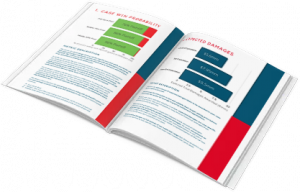
Oral voir dire in federal and state courts have been known to hinder the discovery of important information about potential jurors. In federal courts, voir dire questions are limited to what you can ask, who can ask them, the time allowed for questioning, and the ability of individual juror questioning. This means that an alternative method for obtaining vital juror information needs to be developed.
One essential tool for reducing some of the problems caused by a limited voir dire is a supplemental juror questionnaire (SJQ). The SJQ is specifically designed to supplement information for questioning in voir dire. There are many notable trials in recent years which have successfully employed an SJQ, including the following: In re Exxon Valdez, International Paper v. Affiliated FM Insurance Co., Mercado v. Warner-Lambert Co., Royal Palm Resort v. Mitsui Construction Co. Ltd., Schwaller v. Merck & Co., California v. Michael Jackson, California v. O.J. Simpson, Connecticut v. Michael Skakel, California v. Philip Spector, Kansas v. Scott Roeder, Rhode Island v. Michael Derderian, United States v. William Jefferson, United States v. Timothy McVeigh, United States v. Zacarias Moussaoui, United States v. Terry Nichols, United States v. Oliver North, and United States v. Theodore Stevens (This is discussed in a recent American Bar Association article on the topic).
Why Is a Supplemental Juror Questionnaire So Important?
Here are six good reasons:
1. Increased juror disclosure and candor
This is the number one reason for an SJQ and should be your primary argument when advocating for one. Written questionnaires provide jurors with a sense of privacy and comfort. Being made to answer questions in open court in front of other jurors (and often, the press) can make jurors uncomfortable and therefore less honest and less likely to disclose important information. With an SJQ, jurors feel a sense of anonymity and are likely to divulge additional—and more detailed—information, especially about sensitive topics.
The unfortunate reality is that some judges find it hard to accept that an oath doesn’t always serve as a guarantee of accuracy. Compelling evidence for this is found in one study (Chang and Krosnick, 2010) which compared a self-administered questionnaire to an oral interview. It found that the questionnaire was significantly less susceptible to bias in a range of categories, demonstrating that there is more honesty in a written response than an oral one. The reality is, although the voir dire process should be about honesty, written responses are generally more likely to reflect a panelist’s true experiences and attitudes.
2. Less reliance on demographics
Demographics are a substandard predictor of a juror’s ultimate disposition on a case. In fact, research shows that using stereotypes can sometimes be accurate at the group level (e.g., societal level statistics) but are rarely accurate at the individual level, as in predicting what one person will decide in a jury.
When lawyers cannot discover a potential juror’s real experiences and opinions in an honest and reliable way, often the only choice available is to rely on what they see. The result of that approach is the application of less reliable stereotypes to basic demographic information. This can create conflicts with the law’s restrictions on discrimination in jury selection. Relying solely on demographics may also result in a less diverse jury that is not representative of the community. The SJQ gives lawyers a glimpse into juror attitudes and experiences and serves as a much more valid and reliable basis for strikes.
3. More precise questioning and greater overall information
SJQ’s provide more precise and reliable data and information. All questions allow for a range of options beyond a simple “yes” or “no” response (which are psychometrically problematic and yield the least useful information) and all potential jurors will be answering the same questions. The fairness of the questions should be agreed upon by both sides of counsel. This serves as a checks-and-balances and on any effort to for either side to play games. The end result is to be able to precisely score all of the results. In addition, this analysis makes it possible to identify the best juror candidates in the event of peremptory or cause challenges. SJQs provide a greater range of information to both parties and enhance the quality of information the parties can uncover during voir dire.
4. The chance to pre-screen and disqualify jurors in advance
The SJQ can be a great tool for eliminating potential jurors from further consideration in the process of jury selection. The court may decide in advance if certain answers by jurors display any of the following characteristics which would disqualify them from jury service: bias, a conflict of interest, a possible tainting of the panel, or demonstrate hardship. When jurors give undesirable answers, the court can simply remove them from further consideration. Thus saving valuable time on a potential juror who will not be qualified to serve.
5. Speeds up voir dire and the jury selection process
This one could be a tricky point to argue. A questionnaire is not necessarily quick to process and could take more of the court’s time; but a thorough voir dire, aided by a questionnaire, will take less time than conducting the same oral voir dire conducted in court. Why? This is because supplemental juror questionnaires help reduce the need for repetitive questioning of jurors. Neither lawyers nor the judge will need to chase down answers from each individual juror or panel of jurors to questions that appear on the questionnaire. As a result, this will save valuable court time as well as reduce juror boredom. Many questions (i.e., demographic, work history, prior victimization, etc.) can all be efficiently addressed in a questionnaire, reserving voir dire for any necessary follow-up. This ultimately speeds up the process of jury selection.
6. More focused and effective follow-up questioning in oral voir dire
The supplemental juror questionnaire is certainly not a substitute for oral voir dire, but it can play a major role in uncovering valuable information that should be pursued further in oral voir dire. Administering the questionnaire in advance can reduce oral questioning so that it is more focused.
Honest answers contained in the supplemental questionnaires typically reveal information that otherwise might not have been shared in oral voir dire. For example, a juror may admit on the questionnaire to having been arrested in the past or to have been a victim of an assault. Many jurors do not provide the same information if asked in oral voir dire and, in that way, preclude follow-up regarding potentially critical information.
Promoting effective follow-up questions is not restricted to the domain of sensitive topics. Even with respect to safer, less harmful information, like a juror’s familiarity with products at issue in the lawsuit, a juror’s answer can serve as an important starting point for more in-depth questioning.
How Jury Analyst Can Help

We are building an incredible data platform that manages all of the processes required to prep for jury selection. The development of a Supplemental Juror Questionnaire (SJQ) takes time and that means that you need to engage with us to solicit our help—ideally, the earlier the better. The optimum lead time for contacting us would normally be approximately six months prior to your case’s court date. In the event you do not have this amount of lead time, our Virtual Focus Group platform will allow us to get you the information you need through testing various themes and topics, gaining public sentiment on the issues pertinent to your case, and more.
Jury Analyst will supply you with the key elements needed to develop your SJQ. Utilizing our network of virtual jurors, we perform essential pre-trial research in multiple stages. For example, you can discover what potential jurors think about your case using our Virtual Focus Groups. These sentiment virtual groups help define key issues while still in the pre-trial discovery phase. You discover if the community is on your side and what aspects of the case are most important. Then, you can develop compelling case themes targeting what they want to know.
Jury Analyst can also conduct segmentation Virtual Focus Groups to uncover experiences, stereotypes, and biases that jurors are reluctant to divulge during oral voir dire questioning. You will obtain a virtual juror pool with an accurate, true-to-life potential jury panel based on your local jurisdiction.
With data analysis our algorithms and extensive data sources gathered from these Virtual Focus Groups, we next help you to design juror profiles to uncover the best and worst jurors for your case. With our customized SJQ and targeted oral Voir Dire services, we also help define critical questions to match to juror profiles. This ensures you connect the profiles from your Virtual Focus Groups to potential jurors sitting in the box.
We accomplish this matching process by submitting a survey prior to the development of the questions for the SJQ. We add several different types of questions to the surveys, leveraging predictors like demographics, psychographics, and behavioral measures. This allows you to uncover the best and worst jurors for your case.
We also integrate some invaluable tangential questions. These are more or less like “karma” questions relating to your case but not addressing the specifics of the case. In the event you do not or cannot get approval for your SJQ, we can still work with you to help integrate some of these invaluable tangential questions into your voir dire and get you the correct themes and sequencing for oral voir dire.
Finally, we apply this background research by matching each juror with the corresponding profiles and ranking them with the aid of machine-learning algorithms. We provide scoring on the risk of each potential juror on your list on a 100-point scale. Our team of data scientists and the social psychology PhDs can assist you with better understanding this new information.
Tips For Getting SJQ Approval
There is an old saying that states you get 0% of what you don’t ask for!
So, before you decide that it’s not possible to get a judge to approve a supplemental juror questionnaire (SJQ), you owe it to yourself to at least ask! The secret is to make the decision easy for the judge to say “Yes.”
Getting a SJQ approved requires advanced planning and a time commitment. Also, it must always be submitted in advance to the judge on your case.
Here are a few quick tips to help you in your effort to obtain approval:
1. Get opposing counsel on board. This step can sometimes be more difficult than getting the judge to agree. Generally, you can get your opponent’s buy-in by assuring them that their side will also get to add useful questions of their own to the SJQ.
2. Let the judge know that both sides want the questionnaire. Tell the judge during a hearing or pre-trial conference (well in advance of the trial date) to gauge the judge’s feelings on the issue. Typically, if both sides are on board, the judge will be more amenable to the idea. However, there will still be hurdles to overcome with the Court.
3. Negotiate the final draft with opposing counsel. It is important to approach the judge with a single, agreed-upon draft from both sides. If the judge doesn’t have to spend time negotiating which questions should be added or deleted from the questionnaire, he will be more likely to just approve it.
It’s also extremely helpful to categorize the questions on the questionnaire. They should fall into one of two categories:
1) questions that lead to strong juror distinguishers that you feel are critical to your case
2) questions that are nice to have but you’d be willing to give up or use as bargaining chips (in order to save time for your more important questions)
4. Make the process as easy as possible for the court’s staff. The fewer the tasks the court’s staff has to complete, the less expense there will be for the court. The less the court has to pay for, the better your chances for SJQ approval. If the court has to spend time and money copying SJQs for prospective jurors to fill out, your request may very well receive a resounding “No” from the judge. Simplify the process so that all the court has to do is hand out the questionnaires when jurors arrive and provide completed forms back to you to scan.
5. Ask and, if necessary, file a formal motion requesting the questionnaire. If the judge is not on board with an SJQ, then it may be necessary to bring more weight to bear on the matter. A formal motion to request an SJQ must focus on the benefits. (See our six main arguments in favor of an SJQ above.) In addition, the motion should reference examples of venues (and there are hundreds) in which SJQs has been accepted.
About Contributors:
Sholie Aina, J.D. Harvard Law School with expertise in legal research; Yale University, B.A. in Psychology, cum laude.
Dr. Bettina Casad, Social Psychologist with over 30+ peer-reviewed published papers from The Social Psychology and Neuroscience Research Lab at the University of Missouri-St. Louis.
Dena DaSilva, M.B.A. Pepperdine University, Content Team Strategist at Jury Analyst.
For more information on SJQ’s specific to COVID-19

